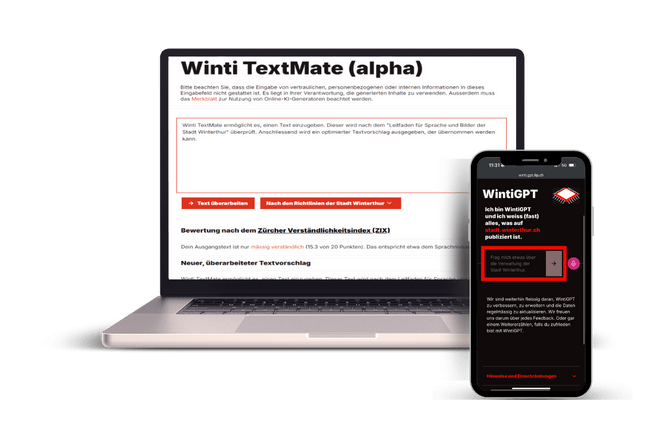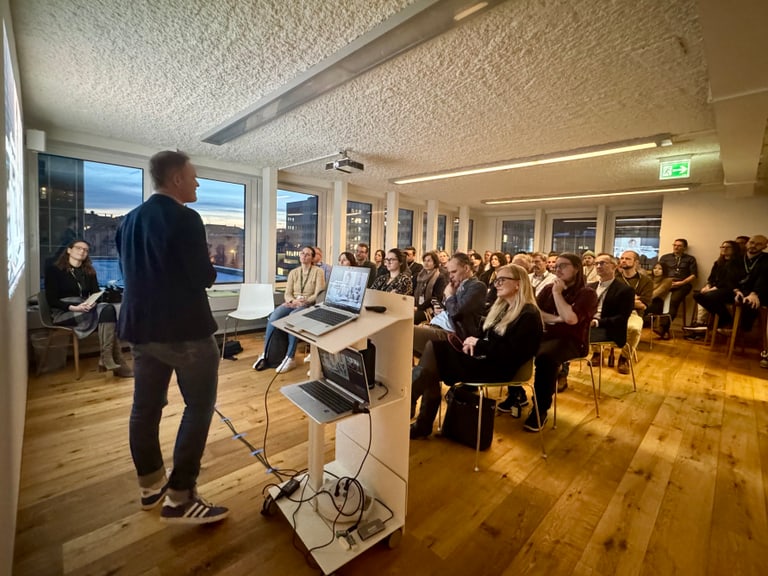Christoph Zech, Digital Officer IDW at the City of Winterthur, shared his perspectives on this transformative technology at a recent Liip client event in St. Gallen, themed "KI ohne Blabla".
The city of Winterthur's administration has been examining the impact of generative AI on its work. To further explore its potential and risks, we supported with an innovation project.
As part of the innovation project "Generative AI Assistance for Winterthur," use cases that positively impact work efficiency, work quality, and customer satisfaction were identified. The goal was to raise employees' awareness of the topic and develop essential foundations.
We worked with various departments in a joint innovation lab to develop user-centred use cases in generative AI. These were made tangible for the city of Winterthur employees through experiments in a protected environment. By actively involving the employees, we familiarised them with the topic, observed their usage behaviour, analysed the opportunities and risks, and derived foundations and recommendations for action for the future.
The Role of Generative AI in Public Administration
According to Christoph Zech, Generative AI is one of the most impactful technologies he has encountered in his 30-year career. "Employees who can skillfully leverage Generative AI will have significant advantages over those who cannot," he explains, emphasising its ability to enhance employee productivity and efficiency across various roles.
He identifies two major areas where AI can revolutionise public services:
- Personal Assistance – AI can support employees in everyday tasks such as writing, translating, and researching.
- Specialised Applications– AI-driven tools can transcribe meetings, assist in decision-making, and even facilitate creative processes within public offices.
Challenges: Data Protection & Human-Centric Approach
Despite the clear benefits, Christoph Zech acknowledges two key challenges:
- Data Protection: Public administrations handle sensitive information, making AI integration complex. "We focus on use cases that do not involve personal or confidential data," he stresses.
- User Adoption: It is crucial to ensure employees feel comfortable using AI. Winterthur has implemented a proactive training approach, including Kickstarter training sessions and hands-on training with employees and executives of the city Winterthur. "It is essential to involve people, focus on their needs, create user-friendly applications, and raise awareness about opportunities and risks. I like to emphasise the opportunities first before addressing the risks," Christoph Zech highlights.
How Winterthur is Using AI Today
Winterthur has taken a pragmatic and experimental approach to AI, launching innovation projects through its Smart City initiative. One of its most successful implementations is a language tool powered by our LiipGPT solution.
"Our AI-powered tool TextMate helps employees ensure that official texts follow accessibility and diversity guidelines. In just six months, it was used over 12,000 times with a user satisfaction rate of 88%," Christoph Zech proudly shares.

Advice for Other Cities and Organisations
For municipalities considering AI adoption, Christoph Zech advises against over-planning: "Don't start with a big strategy. Just get started and experiment—while staying within legal boundaries."
He also highlights the importance of passionate AI advocates within organisations who drive adoption and excitement.
A Collaboration Built on Trust and Innovation
Christoph Zech describes Winterthur’s collaboration with Liip as a mutually inspiring process that he appreciated very much: "Our partnership was based on agility, pragmatism and professionalism. The open exchange of knowledge was extremely valuable, and we worked together at eye level," he reflects. Especially because Liip already had some experience working on these topics with other public administrations.
As AI continues to evolve, the City of Winterthur sets an example for how public administrations can responsibly and effectively harness its potential. The key takeaway? AI isn’t just about automation—it’s about empowering people.

